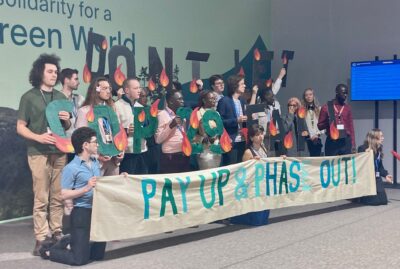What’s Making this COP Especially Difficult?
Notes from COP29 in Baku, where the subject of real money, U.S. politics, and other tricky factors are converging.

My UCLA colleagues Ted Parson, JP Escudero and I just returned from Baku. Most of our work there related to side talks on advancing methane regulation (and our UCLA project on that topic), but we also got a sense of how the central negotiations were unfolding. As the New York Times and others are reporting, Week 1 talks did not go well. Here are the core difficulties impeding progress according to folks we spoke with on the ground there.
First, the central topic of this year’s talks is one that causes real strife: it’s cold, hard cash. Countries aim to set a new, ambitious goal for climate finance to be provided by wealthy countries to those countries least able to deal with the effects of climate change. (Not coincidentally, those least-able countries are almost always also least responsible for climate emissions.) The amounts of money being discussed are very significant — up to trillions of dollars. With that amount of money on the table, countries are motivated to ensure that the finance program is structured to their benefit. Key questions include, for example, how much of the money will come as grants versus loans; what private funding, if any, should count toward the financial pledge; which countries should pay into the fund (only traditional developed countries like the US and EU members? or China and other big emitters too?); and which countries should receive access to the fund, on what terms. These are hard questions that countries care deeply about resolving in their favor.
Second, the US political context makes resolving these finance questions much more difficult. With a Harris term on the horizon, the US delegation could have made credible pledges and exercised the usual levers of diplomatic pressure to persuade others to do the same. With Trump coming in having promised to (again) pull the US out of the Paris Agreement, the US delegation–that is, the delegation of one of the world’s richest countries and largest historic emitters–can’t have much credibility or force here. That hurts.
Lastly, the fact that this COP presidency belongs to Azerbaijan is a compounding factor that makes resolving the first two problems trickier than it might otherwise be. Climate change negotiations are often hard; that dynamic isn’t new. Typically, a COP presidency uses all its skills to overcome difficulties through the nuanced work of diplomacy. That may still happen in Baku, of course, especially with the arrival of high-level ministers this week who are empowered to make hard calls if necessary to reach a deal. But the Azerbaijani presidency may not be as facile at this work, or as motivated to reach for ambitious outcomes, as other hosts might have been. (It did not go unnoticed that the Azerbaijani leader Ilham Aliyev used the occasion of his opening remarks at COP29 to call fossil fuels “a gift from God,” for example –which makes it harder for the COP presidency to then play its usual ‘honest broker’ role in resolving disputes.)
We’ll see if these dynamics can be overcome in the days that remain. The COP is slated to wrap up on Friday.
Reader Comments
2 Replies to “What’s Making this COP Especially Difficult?”
Comments are closed.




“….Azerbaijani leader Ilham Aliyev used the occasion of his opening remarks at COP29 to call fossil fuels “a gift from God”……”
Cara, thanks for sharing. All of us should remember to give thanks to God for all of His many Blessings, including food, shelter and fossil fuels which we depend on. Amen
Thank you for sharing your main points from Week 1 of this year’s COP.
I truly hope that a deal on climate finance will be achieved by the end of it. Otherwise, developing—least responsible—countries will stay in their deadlock without the necessary resources, exacerbating the already horrific state of climate and environmental injustice. And we will continue to do nothing about it.